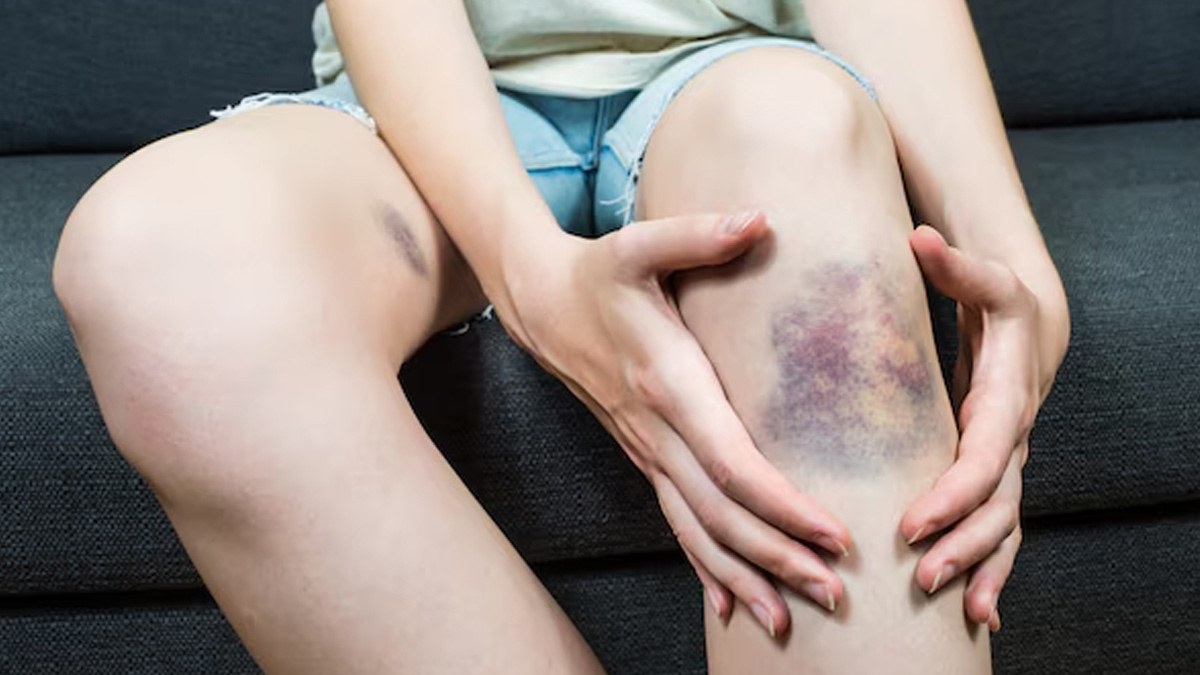
Have you ever woken up with random bruises on your body – that too without any memory of an injury? A black and blue on your arms or on your calves? If that is the case, you’re not alone. Bruising without a known injury, while not extremely common, is a fairly frequent occurrence. An UpToDate research article cited a US survey of 500 healthy adults, in which 18% reported easy bruising. And it is usually women who are more likely than men to suffer from such episodes.
Table of Content:-
Speaking with the OnlyMyHealth team, Dr Paritosh Baghel, Senior Consultant - Internal Medicine, SL Raheja Hospital, Mahim, highlights some of the causes associated with random bruising and how to prevent it.
Also Read: Haemophilia B: The Rare Disorder That Might Be Hiding Behind Your Bruises
Why Do Bruises Occur?

Bruises, also known as contusions, occur when small blood vessels under the skin are damaged and leak blood into the surrounding tissues, causing a discolouration. This typically happens due to a bump or blow to the body, but certain medications, conditions, and even age can make someone more susceptible to bruising.
Nutrient Deficiencies To Blame?

According to Dr Baghel, spontaneous bruising can potentially signal latent health problems, including nutrient deficiencies.
For instance, vitamin K deficiency is a leading cause of easy bruising. Vitamin K is crucial for blood clotting, and a deficiency can lead to increased bleeding and bruising. This can manifest as excessive bleeding from minor cuts, nosebleeds, bleeding gums, and blood in the urine or stool.
Additionally, iron deficiency anaemia, a condition where the body doesn't have enough iron to produce haemoglobin, a protein in red blood cells that carries oxygen, is a common cause of easy bruising. Iron is a crucial mineral that helps produce healthy Red Blood Cells (RBCs), and a deficiency can lead to a reduced number of RBCs or even lower platelet counts. Platelets are vital for blood clotting, so a deficiency can result in more bruising and bleeding.
According to the World Health Organization (WHO), anaemia particularly affects young children, menstruating adolescent girls and women, and pregnant and postpartum women. WHO estimates that 40% of children 6–59 months of age, 37% of pregnant women, and 30% of women 15–49 years of age worldwide are anaemic.
Dr Baghel adds that vitamin C deficiency (scurvy) can also lead to unexplained bruising, as it weakens blood vessel walls.
Underlying Conditions That Can Cause Bruises
“Bleeding and clotting disorders and clotting factor deficiencies (e.g., factor VIII, IX, or X deficiencies) can cause random bruising as well as joint swelling,” shares Dr Baghel. While he notes that minor, occasional bruises are usually harmless, repeated bruising without significant trauma, large or multiple bruises appearing together, or bruises associated with painful joint swelling should not be ignored.
These may indicate a bleeding or clotting disorder and warrant prompt medical evaluation.
Is It Age, Or Can Certain Medications Lead To Random Bruising?

Both age and certain medications can lead to random bruising.
As we age, our skin thins and loses some of its protective fat layer, making blood vessels more susceptible to damage from minor bumps or pressure, leading to bruising.
Certain medications, particularly those that affect blood clotting like anticoagulants or antiplatelet agents, can also increase the likelihood of bruising, even from minor injuries.
Also Read: Do You Frequently Bump Into Things And Bruise? Here's What You Should Add In Your Diet
How To Reduce The Risk Of Severe Bruising
According to Dr Baghel, the most important step is to identify the underlying cause.
He advises, “If a medication is linked to bruising, a doctor might suggest changing the dose or stopping it. Fixing deficiencies in vitamins or clotting factors is crucial. Eating a balanced diet with plenty of fresh fruits and vegetables can help prevent nutritional issues. Regular medical check-ups and prompt treatment can lower the risk of severe or recurring bruising.
Conclusion
If you’re someone who has repeated bruising without any known injuries, then it could be due to underlying factors like clotting factor deficiencies, bleeding or clotting disorders, age, and certain medications. But no matter the cause, it is crucial to consult a doctor to manage the condition and reduce the possibility of severe bruising.
Also watch this video
How we keep this article up to date:
We work with experts and keep a close eye on the latest in health and wellness. Whenever there is a new research or helpful information, we update our articles with accurate and useful advice.
Current Version